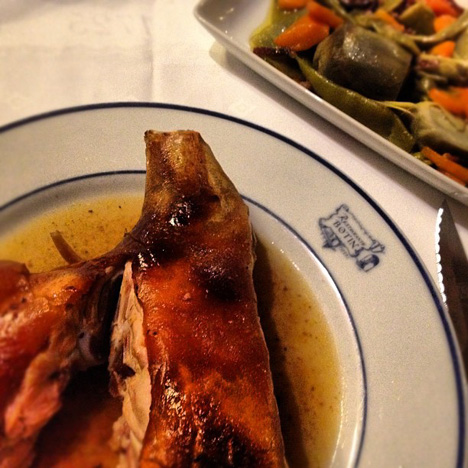During my time with the Blue Zones/National Geographic team, I had the highly satisfying experience of having something that I do instinctively, passionately and naturally confirmed as A Good Thing.

I learned that eating pork can make you live longer. Or, more scientifically, one of the dietary staples that the various communities in the Blue Zones around the world had in common is pork – read more on that here.
Pork is a protein-rich substance that clears the skin, protects the liver, detoxifies the lungs, even cleanses the system of cholesterol. Okinawans – lauded as the longest lived people on the planet – are the only Japanese to eat pork. The Japanese as a whole do not rate high on the life expectancy stakes. Only the pork eaters.
Dan Buettner and I talked a lot about meat consumption. He’s a reticent meat fan. But I think we agree: meat is great. But eat more… and less (see below), is my mantra.
Dan says:
“Pork is interesting. It’s an anomaly and I would not have guessed it, but I can’t deny it. One Okinawan scientist studied this. His theory, and I’m not sure I agree with it completely, is that because pig is the most genetically similar to humans, there’s something in the pork protein that helps repair arterial damage. What he cites is that in America we die of heart disease and the Japanese tend to die of strokes, but in Okinawa they have fewer strokes. This is part of the reason they live longer. The doctor theorizes that it’s because they eat more pork than any other prefecture of Japan, and pork protein serves almost as caulking.”
This trip I’ve celebrated pork everywhere. I’ve craved it, my body has benefited almost immediately from it, I’ve been thoroughly grateful for it. In Spain it was Iberian pork – roasted, as a prosciutto type tapas, as salami, in omelettes.

In France, I ate pork trotters in a garlicky, gherkiny sauce. For my slow food guide to Provence, click here.
Back home in Byron I eat the famous organic Bangalow pork. Not in huge quantities. But respectfully. And always with a lot of appreciation. I also eat the fat, the marrow, the cartilage, and sometimes the bones. That’s what I mean by respectful. I don’t toss out bits.
Here in Greece, I’ve been eating pork as it should be eaten. Slow-cooked in it’s own juices and fat (nothing added apart from some lemon juice and oregano). Here the whole animal is eaten, not just the fashionable cuts. Respectful.
This is something I’m becoming increasingly passionate about: eating less while eating more.
That is, eating smaller quantities, but eating the whole animal. More on this later…
At the panygiri (the local village festivals), pork broth is consumed throughout the night. My friend Eleni told me this: always drink one glass of wine, one glass of water, one swish of pork broth. Do this all night and you stay sober and energised.
One hot afternoon we visited Eleni, Thea’s 85-year-old aunt. She bakes her own bread and grows all her own veggies. While we were filming, she whipped us up a little something to “snack” on…see the main image above. That’s how it’s done here. The recipe below is a version of it, albeit not using a fresh pig and fresh ingredients picked that morning. It’s one of those recipes where you’ll have to adjust things according to the type of meat you use. Either cook in a slow cooker or in a big pot in the oven.

Icarian lemon pork
1 kilo pork, preferably shoulder or collar, cut into stewing size pieces, or about 6 pork chops
1 onion, sliced into rings
2 cloves garlic, crushed
1/3 cup olive oil
1/4 cup water or stock
salt
juice of 2 lemons
1-2 tbls cornflour or arrowroot
Place the meat in the slow cooker (only remove REALLY chunky bits of fat…you need to leave quite a bit of fat on to really get the full Greek flavour), pour the stock/water, half the lemon and the oil over the top, and place the onion and garlic on top. Sprinkle with plenty of salt. Cover and cook for 6-8 hours on low. When done, ladle out some of the juices, mix with a tablespoon or two of cornflour and the rest of the lemon juice and pour back over the meat and stir. Cook for another 30 minutes. Serve with horta (greens), salad, olives, cheese and wine.
Let me know how you go with this one. Remember, the point is that the pork cooks in it’s fats and juices. Don’t overtrim and make sure you buy some cuts with plenty of fat!


